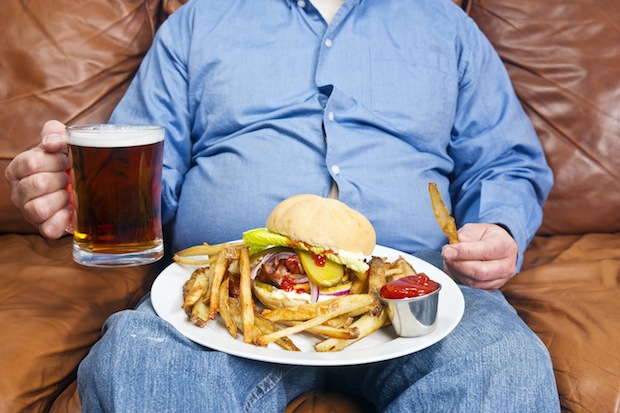Trying to get good, healthy, nutritious food down the ungrateful throats of the lower orders, especially northerners, has become a serious national problem. At the moment these awful people eat nothing but fat coated in breadcrumbs and deep-fried in engine oil, and so as a consequence they are gargantuan, slobbering masses of compacted lard, so vast that there would be room, if they so wished, for Hogarth to do their tattoos. Have you ever wandered about in the centre of Sheffield or Rotherham? It’s like being transported to a film set where Quentin Tarantino is shooting a version of Gulliver’s Travels with belching and farting, shellsuit-clad Brobdingnagians waddling and wheezing in and out of fast-food shops, gripping hold of deep-fried oblongs of saturated fat with their black-pudding fingers.
Poverty, we are told, is the major cause of this epidemic of obesity, but I’m not sure I buy it. I heard one chap from a leftish think-tank explain that northerners eat this cheap fattening filth because it is very quick to heat up in the oven, and they cannot afford to have the oven on for longer than 20 minutes because of the prices charged by those bastards who run the energy companies. Surely, then, a simple solution would be for the poor to invest in an Aga? I have had a shin of beef casserole with morels, butter beans, black kale and Puy lentils bubbling away for the last three hours — no extra cost, because the Aga is always on! Sometimes the lefties don’t think of these common-sense solutions, probably out of resentment and bitterness, and yet one of the upper-end Agas would improve the look of their usually rather frowsy kitchens no end.
We are constantly told that we are in the grip of an obesity ‘epidemic’, the word ‘epidemic’ suggesting that it is something extraneous which has been imposed upon people, in the manner of the black death, or influenza. But of course it isn’t, as Max Pemberton rather brilliantly explained in last week’s magazine. That the explanation was necessary is the shocking thing, in a way; we are doing with obesity what we have done with alcoholism and drug addiction, which is to remove the individual’s responsibility for the predicament in which he finds himself. By describing obesity or alcoholism as a disease, rather than lose weight or stop drinking he can demand treatment, because he has been afflicted by something which was not of his doing.
As Max argued, telling patients that they are fat and will succumb to some horrible ailment or even die if they do not do something about it is clearly the approach doctors should take. But they have become brainwashed into not doing this, and as is ever the case, the people doing the brainwashing are the third sector: the pressure groups, the quangos, the NGOs, the charities. It is what they always do.
Take Mend, which was set up to combat childhood obesity and has swallowed lots and lots of your money. The acronym stands for Mind Exercise Nutrition Do It, which is by itself sufficient to make me more emetically inclined than a bulimic in a pie factory. The message this undoubtedly well-meaning organisation sends out is that obesity is a medical issue, one afflicting a third of our children, and that subjecting the obese to ‘negative attitudes’ (such as calling them fat gannets, or hideous lard-buckets) is ‘not acceptable or helpful’. Au contraire — yes it is. Remove the stigma and you remove a very powerful inducement for the individual to watch his or her weight. Stigma is what society uses, in an ad-hoc manner, to control behaviour which is antisocial or harmful to an individual. If you insist that we should not stigmatise young single mothers, for example, you will one day have many more young single mothers. So it is with obesity.
Mend does not stop there, however. In its advice to parents it insists that they should not, when talking to their blubber-ridden children, ‘link being thin with being successful and attractive’. Again, au contraire: they should link it at every available opportunity, because being thin will make you more attractive, in most cases, and certainly more successful with the opposite sex. And that again is a powerful inducement to lose weight, is it not? Mend also announced that two thirds of parents wanted ‘more support around discussing weight issues with their children’. This is a fabulously self-serving statement, based upon a self-serving question in the survey they sent out. And again — it is what these charities and pressure groups do. In all of their actions, they assert their own indispensability, even if, like Mend, they have not existed for very long at all and are in fact eminently dispensable.
If you are a charity or pressure group sucking up taxpayers’ money to fight some fashionable cause, there are two things which you must do as soon as you have trousered your first grant. First, big up the cause — insist that it is much more widespread than was believed and hint that it could afflict any one of us at any time. Second, exculpate the individual from even the vaguest notion of blame and insist that it is a condition to be borne by the country as a whole. ‘Don’t blame and shame,’ as Mend has it. And they do this not in order to alleviate the problem, but because they are stakeholders in the problem, and they know on which side their bread is coated with low-fat butter.
Got something to add? Join the discussion and comment below.
Get 10 issues for just $10
Subscribe to The Spectator Australia today for the next 10 magazine issues, plus full online access, for just $10.
You might disagree with half of it, but you’ll enjoy reading all of it. Try your first month for free, then just $2 a week for the remainder of your first year.















Comments
Don't miss out
Join the conversation with other Spectator Australia readers. Subscribe to leave a comment.
SUBSCRIBEAlready a subscriber? Log in